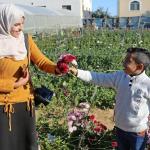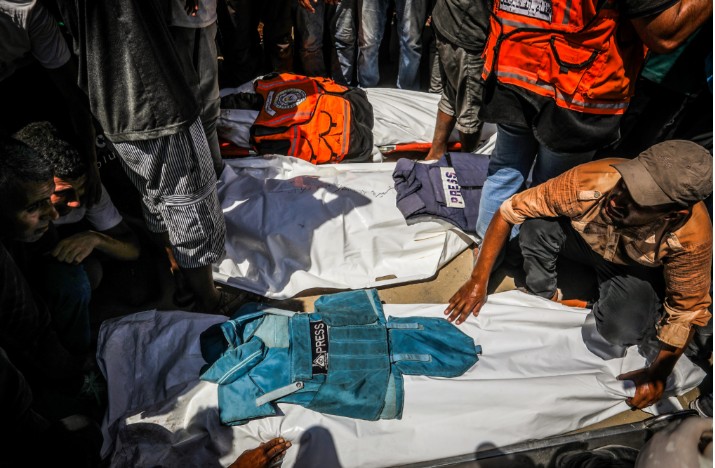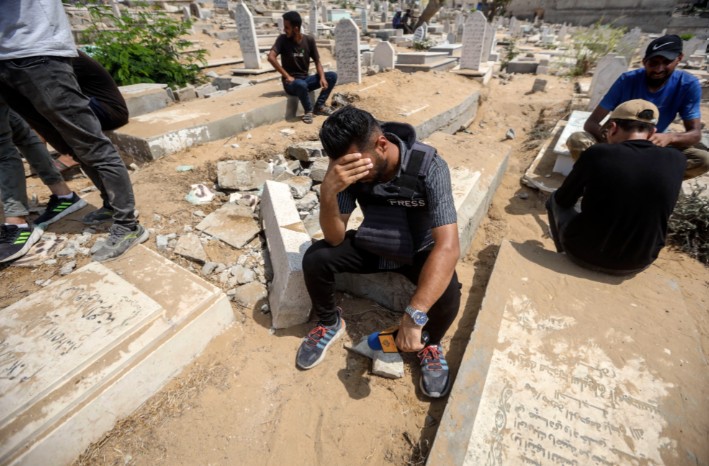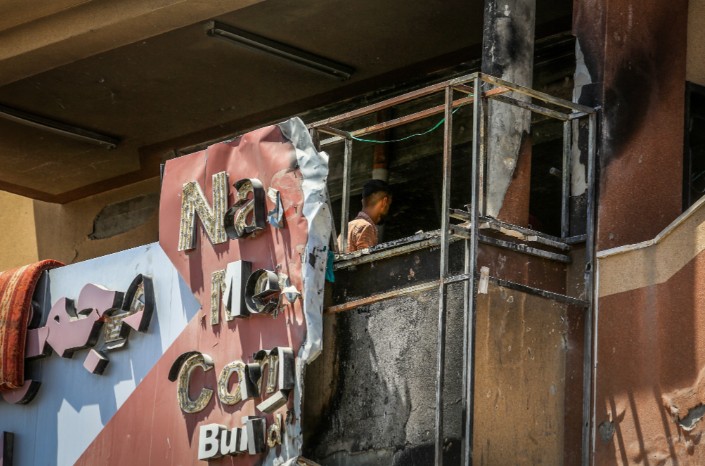Maryam Was My Friend. Israel Killed Her and Four Other Gaza Journalists

Maryam Abu Daqqa was my friend. She was a photojournalist and a mother. On Monday, she was killed by the Israeli army in a “double tap” attack on Nasser Hospital, along with four other journalists. She was 32 years old.
I first met Maryam in 2015 during a photography course in the Italian center in Gaza City, where she was one of the trainees. I was drawn to her energy. I remember thinking how quickly she spoke, as if she had more ideas than time to express them.
She came from Abasan, east of Khan Younis, an agricultural town famous for its fruits, vegetables, and delicious cuisine. Whenever I reported on farming there, I knew I could turn to her. She was always ready to help, and her photos of the village and its people never failed to inspire me.
At first, I didn’t know that Maryam was a mother. One day before the war, while I was working in Abasan, I heard a boy call out to her: “Mom!” I was surprised. She laughed and introduced me to her son. “This is Ghaith,” she said proudly. “He is my man, and he will protect me when he grows up.” She told me all of her work was for him.
Since the war began, I had seen Maryam many times in the field. We always greeted each other and made sure we were both okay, but we didn’t speak much. We were always tired and stressed. The only moments we had to truly catch up were at hospitals in Khan Younis, where she often came to report.
I remember meeting her during Israel’s May 2024 offensive on Rafah. My cameraman was forced to flee north to Deir al-Balah, leaving me to film alone on my phone. Maryam appeared in the ICU at the European Hospital, where I was interviewing an American doctor. Seeing me struggle with my camera, she immediately helped me adjust the settings and offered a few tips. She looked exhausted, and could hardly walk. It was a side of her I wasn’t used to seeing.

Before she left, I hugged her and asked her to be careful. I was scared for her; I knew she had been working in the dangerous eastern areas of Khan Younis only weeks earlier. The last time I saw her was in April, at Nasser Hospital — the very place where, months later, she would be killed by the Israeli army.
On the day Maryam was killed along with 19 others in the attack on the hospital, I was nearby with my family in Khan Younis refugee camp. A deafening blast shook the ground. My mother suggested it might have been a house that was hit, but when I finally found an internet signal and checked the news, the truth became clear. The grief and disbelief were overwhelming.
I thought of her son, Ghaith, the boy she once called her protector, who she cared for so much. I thought of her father, to whom she had donated a kidney to save his life. I thought of my friend; bold, adventurous, always caring for others.
No words can capture what we feel
Since October 2023, Israel has killed at least 230 journalists in the Gaza Strip — more journalists than were killed worldwide in the previous three years, according to the Committee to Protect Journalists. In the past month alone, 11 Gazan journalists have been killed in Israeli strikes, Maryam among them.
On August 10, five journalists were killed when the Israeli army targeted a journalists’ tent just outside al-Shifa hospital in Gaza City. That day, as I scrolled through my phone for any news of a ceasefire, messages began to arrive from colleagues abroad checking on me, asking if I was okay. Alarmed, I turned to the news groups, which were flooded with initial reports of the attack.

Among the six names mentioned, one caught me: Anas Al-Sharif. I was not a close friend of Anas, having spoken to him only a few times about news coming from northern Gaza, but I felt that I knew him well through watching his reports.
Though he had been an on-screen reporter for less than two years, Anas’ presence had left an indelible mark. A 28-year-old husband and father of two, Anas roamed tirelessly through northern Gaza, capturing the voices of residents and documenting the unfolding genocide with unflinching honesty. Even after losing his father to an Israeli airstrike in December 2023, he refused to abandon the mission of telling the truth while enduring the same deprivation as his neighbors.
Indeed, every journalist in Gaza over the past two years has faced hunger, displacement, and the loss of their homes and family members, all while trying to relay Gaza’s raw reality to the world. I too have spent long hours in the streets without shelter. My sick mother, still struggling to recover from spinal surgery, walks beside me and my sister as we search for somewhere, anywhere, to take refuge.
I love my job as a journalist, along with my work as a teacher, yet I am devastated and terrified. It’s been more than 680 days of continuous work, with constant internet outages, no proper electricity, no safe shelter, and no transportation. I’ve continued to report since the beginning of the war because I believe in its mission, but I do it knowing that every day could very well be my last. No words can capture what we feel as journalists with the successive loss of colleagues.
Why is Israel targeting Palestinian journalists in Gaza? Simple. We are the only ones able to document and transmit what is actually happening on the ground. Every image, every testimony, every broadcast we produce pierces through the wall of Israel’s official narrative. That makes us dangerous: by recording the displacement, the starvation, and the relentless bombardment, we expose Israel’s actions to the world.

And so, we are deliberately attacked. Cameras are treated as weapons, and those who hold them as combatants. Our very presence threatens Israel’s ability to sustain its genocidal path — which is why it is doing everything it can to snuff us out.
A desperate need for protection
Earlier this month, after two years of pressure by international press bodies, Prime Minister Benjamin Netanyahu said that Israel would allow foreign journalists to enter Gaza in order to witness “Israel’s humanitarian efforts” and “civilian protests against Hamas.” With no details or timeline, it’s hard not to see this as yet another lie. But even if the international press was allowed free and unfettered access to the Strip, what good would it be if Palestinian journalists in Gaza remain unprotected?
We are tired of working continuously for two years without rest or safety, inhabiting a constant state of anxiety about being killed at any time. And while we demand that our international colleagues enter Gaza to convey its brutal reality to the world, we know their reporting will not differ from what we have already documented.
When a CNN journalist accompanied a Jordanian plane dropping aid over Gaza this month, and saw the enclave from the plane’s window, he described a “sweeping view of what two years of Israeli bombardment has done … utter devastation across vast areas of the Gaza Strip, a shocking desert of ruins.” This is what we have been saying from the ground for almost two years: Israel’s destruction of Gaza is massive, and it will only continue without an end to the war.
When I was 9 years old, my house in the Khan Younis refugee camp was destroyed by an Israeli bulldozer. That image did not leave my mind. And when I saw journalists working to convey what happened to my home to the world, I decided I wanted to become one, too.
I believe that journalists have immense value, but in Gaza, they are killed in front of the world and no one takes action. We fear losing more of our colleagues, and we desperately need international protection — before Israel succeeds in silencing Gaza’s voice.
[Ruwaida Amer is a freelance journalist from Khan Younis.]
Our team has been devastated by the horrific events of this latest war. The world is reeling from Israel’s unprecedented onslaught on Gaza, inflicting mass devastation and death upon besieged Palestinians, as well as the atrocious attack and kidnappings by Hamas in Israel on October 7. Our hearts are with all the people and communities facing this violence.
We are in an extraordinarily dangerous era in Israel-Palestine. The bloodshed has reached extreme levels of brutality and threatens to engulf the entire region. Emboldened settlers in the West Bank, backed by the army, are seizing the opportunity to intensify their attacks on Palestinians. The most far-right government in Israel’s history is ramping up its policing of dissent, using the cover of war to silence Palestinian citizens and left-wing Jews who object to its policies.
This escalation has a very clear context, one that +972 has spent the past 14 years covering: Israeli society’s growing racism and militarism, entrenched occupation and apartheid, and a normalized siege on Gaza.
We are well positioned to cover this perilous moment – but we need your help to do it. This terrible period will challenge the humanity of all of those working for a better future in this land. Palestinians and Israelis are already organizing and strategizing to put up the fight of their lives.
